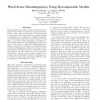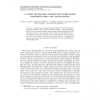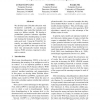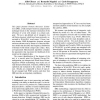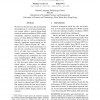23 search results - page 2 / 5 » Contextual Modeling for Meeting Translation Using Unsupervis... |
ACL
1994
13 years 6 months ago
1994
Most probabilistic classi ers used for word-sense disambiguationhave either been based on onlyone contextual feature or have used a model that is simply assumed to characterize th...
CORR
2008
Springer
13 years 5 months ago
2008
Springer
Abstract. A large class of unsupervised algorithms for Word Sense Disambiguation (WSD) is that of dictionary-based methods. Various algorithms have as the root Lesk's algorith...
EMNLP
2007
13 years 7 months ago
2007
We develop latent Dirichlet allocation with WORDNET (LDAWN), an unsupervised probabilistic topic model that includes word sense as a hidden variable. We develop a probabilistic po...
EMNLP
2004
13 years 7 months ago
2004
This paper presents Domain Relevance Estimation (DRE), a fully unsupervised text categorization technique based on the statistical estimation of the relevance of a text with respe...
EMNLP
2007
13 years 7 months ago
2007
We show for the first time that incorporating the predictions of a word sense disambiguation system within a typical phrase-based statistical machine translation (SMT) model cons...
